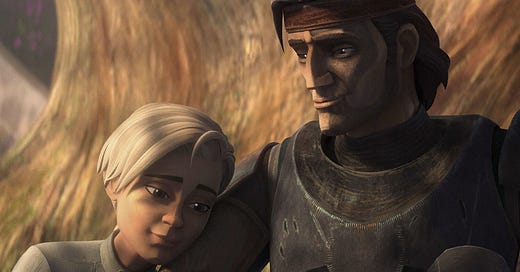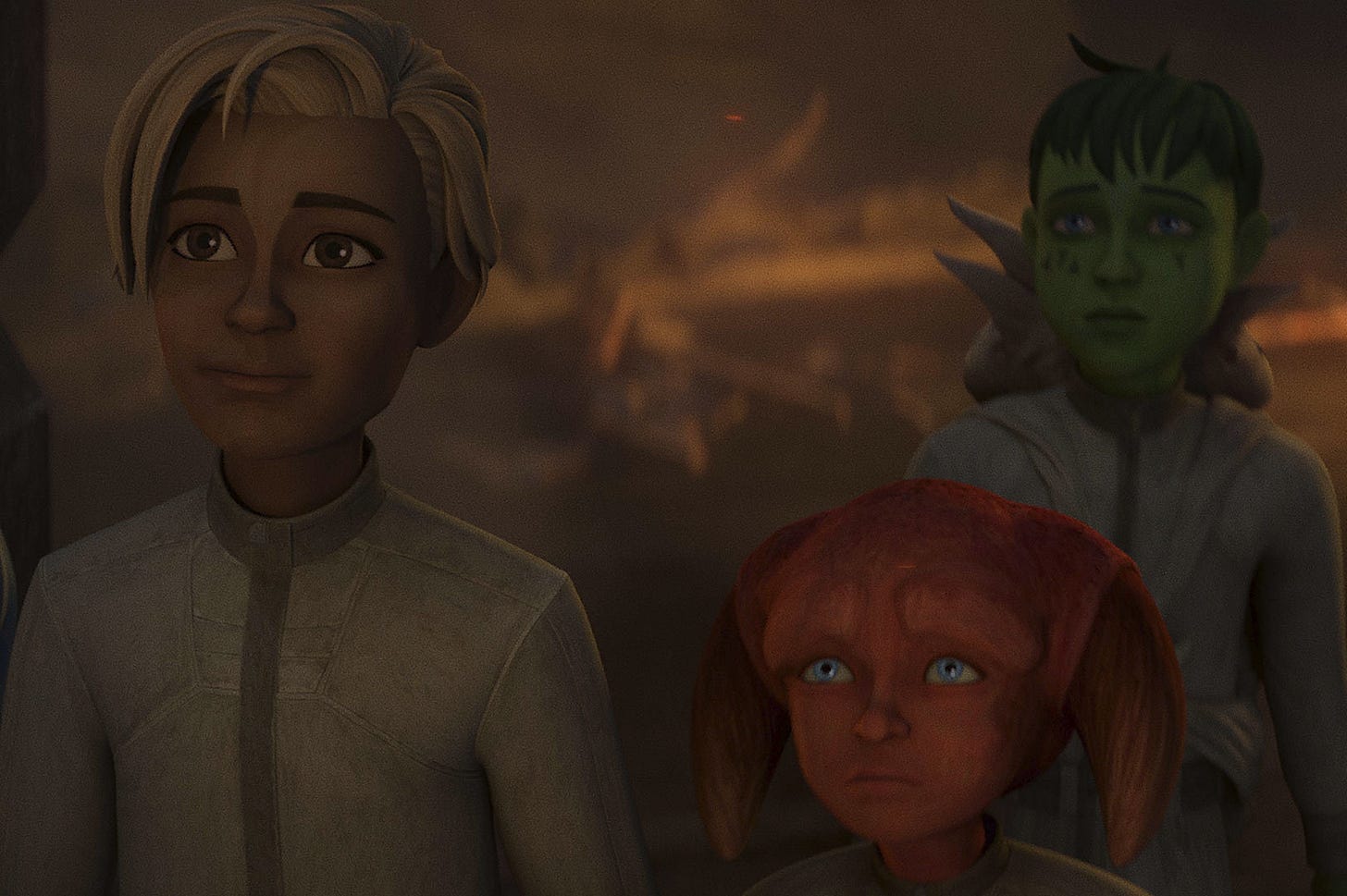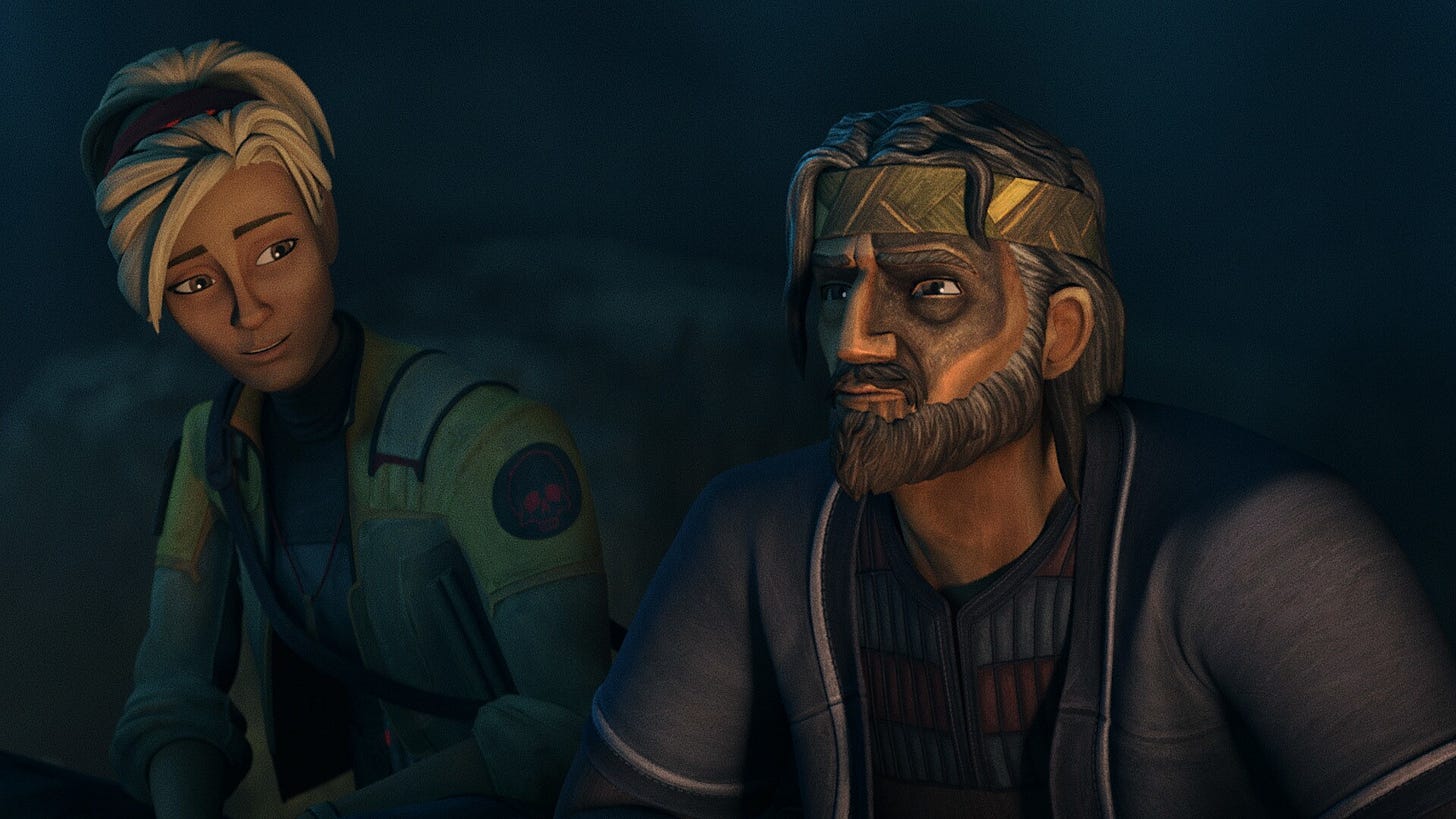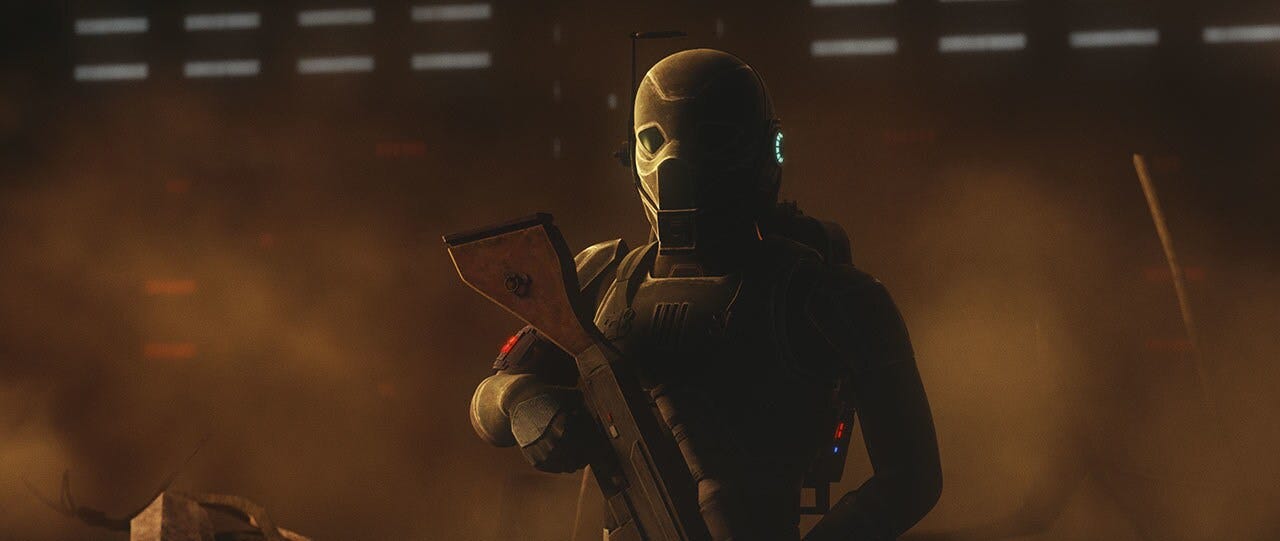The Bad Batch Finale didn’t surprise me (or did it?), and that’s a good thing.
Crosshair, Tiny Tim, and our great expectations.
The Short Take:
Devoid of shocking twists, but that’s fine by me because I got an emotionally satisfying ending for characters I love.
Image Credit: StarWars.com
[SPOILER ALERT: This is not only a season finale but a series finale. So yea, there are going to be spoilers!]
The Long Take:
The Bad Batch Finale is what happily ever after looks like in Star Wars.
I know I am writing this a ways out from when the series finale of The Bad Batch aired. But, rather than lamenting that fact, I thought I could try to leverage that distance. Now that I’ve had some time to contemplate how this series ended, how do I feel about it? What kind of insight can hindsight provide here?
I’m happy to report that I’m still largely positive on how we said goodbye to Clone Force 99. Sure, the finale wasn’t the mind-melting, jaw-dropping, “I can’t believe they…” kind of shocker that had everyone racing to the proverbial water cooler to make sense of it all. If anything, it was shocking in how not shocking it was. None of my less likely or wild predictions from the week prior came true, but, not to brag, essentially all of the predictions I had confidence in did. The Zillo Beast did in fact serve as the catalyst for all the action. Tantiss went the way of the dodo, making room for “Project Stardust.” (In case you need a window into what it’s like to live with me: when Tarkin uttered this key phrase, I leaned over to my husband and whispered, “That’s The Death Star” and he just rolled his eyes at me and said, “I know.”) We didn’t see Bayrn reunite with his mother, but it’s certainly implied because all the kids escaped. Emerie defects from the Empire and joins up with Echo and the other clones.
To be clear, I do not point this out to say that the finale was predictable or boring; in this case, I think it means that the creators did an excellent job setting up on a story and had a clear vision as to how to follow through.
Image Credit: StarWars.com
Relatively speaking, the biggest surprise of the night was in the happy ending for our dear clones. None of our main characters died. Not one! Not even Crosshair, who made it clear multiple times that he was willing to nobly sacrifice himself. Hunter tells him not to even think about Plan 99, and it seems as though the series wholly rejected that notion as well.
Why was this so surprising? I suppose because of Tech’s loss at the end of Season 2. That season finale set the precedent that this was the kind of show that was willing to kill off one of its main characters. The sense of danger heightened, and the possibility of loss became palpable going into this not only season but series finale. That paired with the Rogue One factor — that none of these characters have preexisting stories later in the Star Wars timeline — was enough for me to convince myself that maybe all of them would die.
So imagine my surprise when no one did. On The Rebel Base Card Podcast’s (hosted by
) episode on this finale, / mentioned that once we confirmed with one another that we had watched the episode, he received the following gif from me:Image Credit: Yarn Trailers
This is, for those who do not recognize Gonzo as a lovable and dapper Charles Dickens, from the end of The Muppet Christmas Carol. The joke here, at the risk of over-explaining it, is that it’s funny that a key character — in this case Tiny Tim — did not die because all signs prior to this moment pointed to him dying. In fact, the story — in both The Muppet Christmas Carol and The Bad Batch — seems to be toying with our expectations in that way. Tiny Tim coughs more than enough and everyone in his life seems to be resigned in accepting the eventuality of his death. Similarly, conspicuous comments from characters like Rampart (Gonzo: who did NOT become good) about whether Crosshair had really changed and self-flagellating comments from Crosshair himself certainly pointed to his own death as proof of how far he had come.
But perhaps I’m missing the point here, because now I’m wondering to what extent is the weighty foreshadowing of Tiny Tim’s death for Scrooge’s benefit rather than our own? It’s probably operating on both levels, but, at least in Dickens’ A Christmas Carol, it seems more a device for the morality tale than a plot twist for readers. So maybe the premise I am operating from, the very framework measuring surprise or shock value, was flawed from the start. Maybe this has all been about showing Crosshair that he deserves to live on because he has changed. Maybe he’s the Scrooge.
But then I keep thinking of Crosshair as our Tiny Tim, and we, the audience, as the Scrooge. That in portending his doom and prompting us to emotionally prepare for the tragic yet beautiful end to his redemption arc, that the revoking of his seemingly inevitable fate was to make us appreciate him and what we have been gifted via this happy ending even more. Dare I say, to appreciate life more? To, like Scrooge, learn that there is goodness in the world and that not everything is terrible? In a post prestige TV — and, more specifically, at least for me, a post-Game of Thrones — world, in which no one is safe and stories are so dark and bleak that no one could possibly have a happy ending, the narrative restraint of sparing Crosshair is actually a very bold and refreshing choice.
Image Credit: StarWars.com
Thus, the happier than expected ending is what makes this series and its conclusion a success. There’s a purity to the decision to keep the focus on Omega’s found family and give them a happily ever after that they and I can embrace.
Through this lens, The Bad Batch is the anti-thesis of the Andor/Rogue One storyline, despite my consistent drawing of parallels between the two. And not just because at the end of one everyone dies and at the end of the other no one dies. But because of the outlook of each ending is fundamentally different. As Luthen says in his infamous monologue, “I burn my decency for someone else’s future. I burn my life to make a sunrise that I know I’ll never see.” He and Cassian will do this in a way that fuels the burgeoning Rebellion, but only in exchange for their lives and happiness.
The profoundly comforting epilogue of The Bad Batch, in which an aging Hunter sends Omega off to fight as a pilot in The Rebellion, offers an alternative model. The Bad Batch were given their sunrise by fate (and themselves; I want to give them credit for all the heroic feats we see in this series) and with it they raised Omega to be sharp and strong enough to help fight the Empire later in life. By the way, I am not going to shut up until we get a standalone Omega series or film. Animated or live action, I don’t much care. Just make it happen.
The lesson here, then, may be in narrative mercy, and a reminder that happiness and hope without underlying tragedy can be just as satisfying. (And I do not mean to downplay Tech’s loss here; it’s just that I’m focusing on this season finale in my thinking.)
Yet, how much of this is the series creators intentionally toying with our expectations vs. just the byproduct of the audience’s expectations interfering with the story those creators were trying to tell? I have to admit that in the immediate aftermath of this finale, my thoughts did dwell on how the creators of the series could have possibly made certain decisions without considering the audience’s reactions and expectations in response.
In particular, I’m thinking of the Clone X assassins. When I realized that there was not going to be any big reveal of any of the Clone X assassins, I thought, “Why treat CX-2 as a yet to be unveiled major character if he was just going to be one of many? Why make him so mysterious at the outset?” After the mid-season two-parter, many speculated who CX-2 might be, and if he could be a resurrected Franken-Tech. When watching Hunter, Wrecker, and Crosshair face off against these assassin clones, I actually thought that the reveal might be that Hemlock somehow used Crosshair’s DNA to replicate each member of Clone Force 99, and then it would become dramatically clear during the big battle that they were fighting mirror images of themselves. That would have been thrillingly chilling in Hitchcockian surrealist fashion.
Image Credit: StarWars.com
As time passes and I get some distance from this initial reaction, though, I am thankful for the focused, simple, and pure story we got. I was glad that The Bad Batch ended up as the central figures of their own series, with an implied bigger story about The Clones post-Order 66 just around its edges. Back in that two-parter, I bristled at the idea that Rex came and overshadowed Hunter, Wrecker, and Crosshair a bit. It now makes sense that I would be relieved that he is only mentioned in passing by name in this finale.
The other bigger story that could have potentially swallowed up The Bad Batch was Project Necromancer, which very explicitly resurfaces decades later in The Mandalorian. I now see that I mistook the role of Omega and why she was created as a character. Rather than being the piece to the larger Project Necromancer puzzle, it was the other way around: Project Necromancer was but a blip in her own history. Just as she escapes Tantiss Base and presumably never has to be on the run from the Imperial Science Division again, so too do we escape the burden of Omega — this new character that I am now wholly invested in — becoming a means to a Star Wars canon end. It almost seems, after seeing this finale, that The Bad Batch was poised to be taken over and absorbed by the wider Star Wars canon, but then narrowly escaped and got to have its own time to shine.
Usually its in my Marvel reviews, but I have often in the past talked about how I have been trained to wait with open arms for connections among series and films to drop on me like a ton of bricks, especially at the end of a Disney+ series. And because of this, I have been burned many times when the conflict resolution was the simplest possible option. (WandaVision and The Falcon and the Winter Soldier stand out as the most egregious cases.) This time, though, for some reason, I don’t feel “had.” I’m just happy that it turned out to be less complicated than I thought it might be. Less complicated than we’ve come to (often unreasonably) expect from a franchise story.
And so I conclude by invoking yet another meme:
Image Credit: TV critic Alan Sepinwall on Threads (@sepinwall)
Like Bernie Sanders, I AM ONCE AGAIN ASKING us to not assume everything has to connect and pose implications for the broader galaxy. Star Wars, at its core, is about family and hope. And The Bad Batch gave us those two elements in spades.










The Bad Batch/Muppet Christmas Carol wasn't the crossover I was expecting, but I'm here for it!
Muppet Xmas Carol is a yearly watch in my house as well. Then we follow it with the Always Sunny Xmas episode.